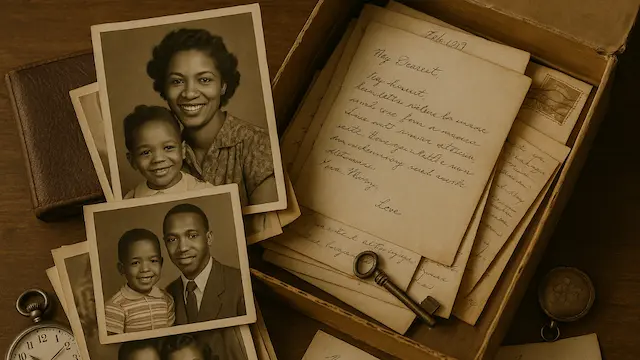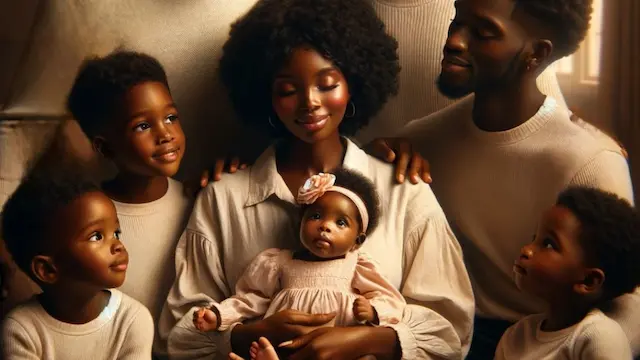Why Cultural Values Make a Stronger Impact Than Performances

What defines who we are, our shared values, or the outward displays of culture we observe in everyday life?
Festivals, dances, and traditions are beautiful expressions of culture, but the deeper values behind them truly shape how we live and connect.
These values influence everything from our decisions to our treatment of one another, often serving as silent guides in our personal and collective journeys.
I grew up around proud storytelling, great food, and music from our culture, but it was the quiet, everyday moments that taught me what our culture really valued.
This post will explore why cultural values hold more power than performances, how they impact our behavior and relationships, and what we can learn when we focus on the principles at the heart of a culture, rather than just its outward expressions.
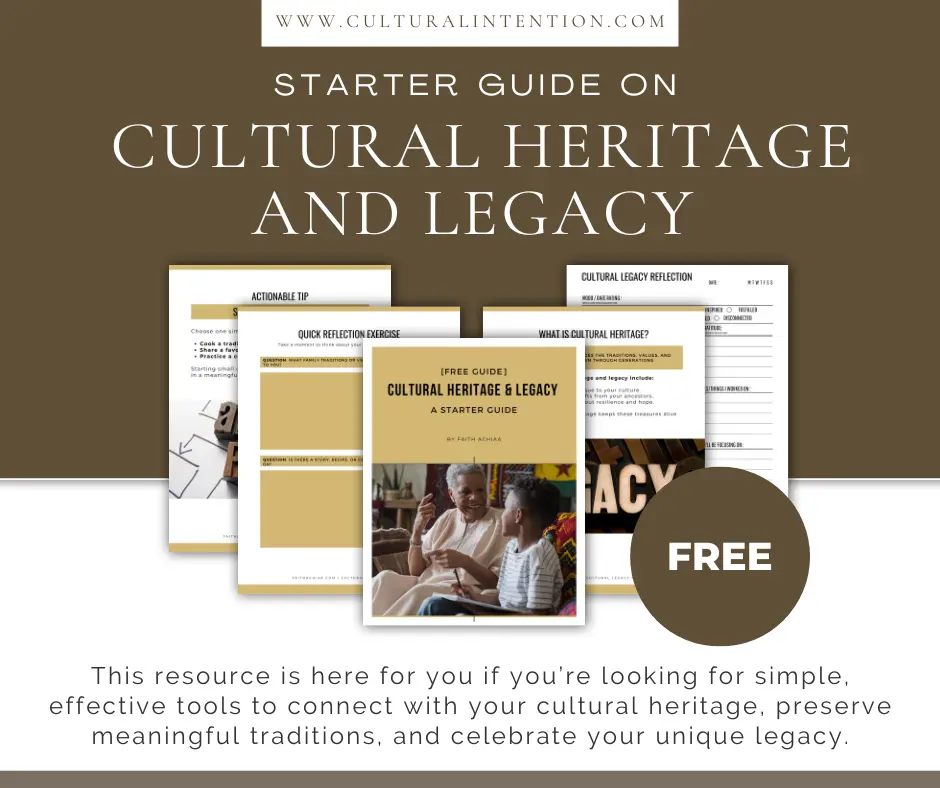
Honor Your Past.
Shape Your Legacy.
Download your FREE starter guide on Cultural Heritage & Legacy—created to help you preserve what matters, honor your traditions, and pass your story on with pride.
Why Cultural Values Matter More Than What We Show
What does culture mean to you? Is it the food you share at family gatherings, the music you hear at festivals, or the traditions passed down through generations?
While these experiences are undeniably meaningful, they're just the tip of the cultural iceberg.
Beneath them lie the values that quietly guide how we live, work, and connect every single day.
These underlying principles—things like respect, kindness, and fairness—do more to shape who we are than the outward performances of culture we often see.
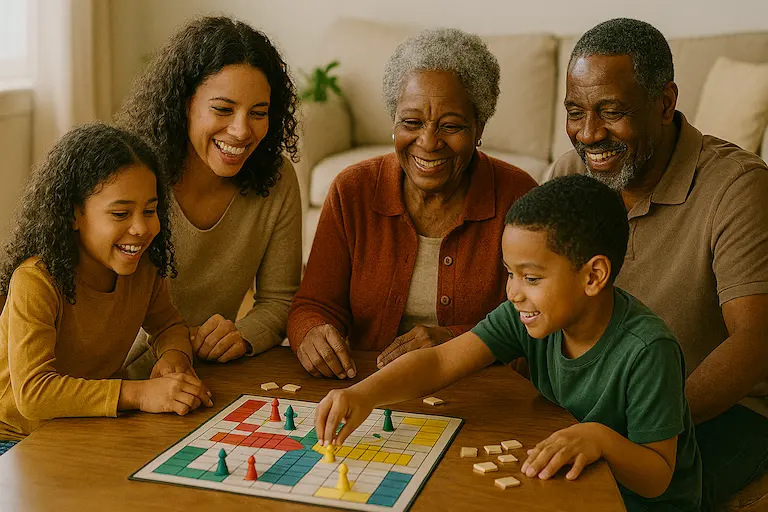
The Difference Between Living Culture and Showing Culture
When we think about culture, it’s easy to focus on the performances: the ceremonies, the colorful outfits, or the public displays of history and pride.
These moments are vibrant, and they grab our attention. But while they’re beautiful to witness, they don’t always tell the full story of what a culture values.
Living culture happens in quiet, everyday moments. It’s the way family members greet each other with warmth, how communities come together in a crisis, or how decisions are made with shared respect.
It’s not announced or put on display, but it shapes how people navigate their lives.
Showing culture, on the other hand, is about presentation. Think of national parades or traditional dances performed for tourists.
Some of us even decorate our homes with symbols, fabrics, or paintings from our culture—but if asked, we might not always know the meaning behind them.
Peeking to my left right now, I see a few Adinkra symbols on display. And honestly? I’d have to look one or two of them up to recall what they stand for.
It’s not a big deal—but it’s a reminder. Surrounding ourselves with cultural markers is meaningful, but it’s the understanding and connection behind them that makes the difference.
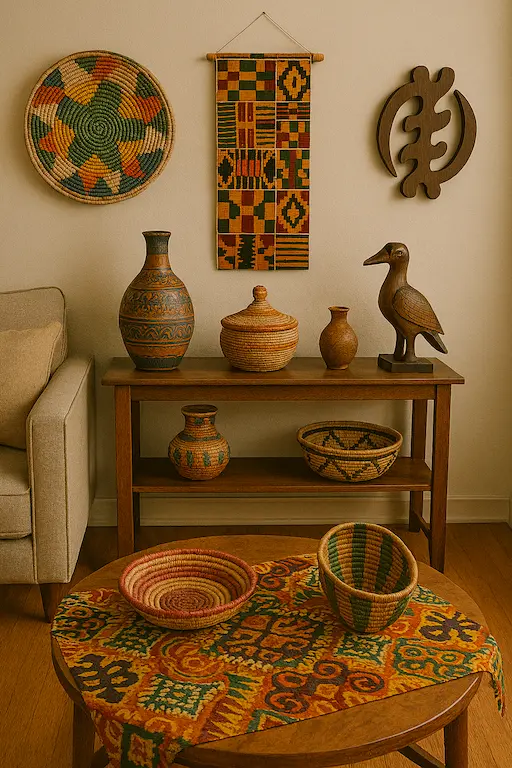
What comes to mind when you look around your own space? Are those items reminders of values, or just decoration?
While these expressions have their place, they often focus on showcasing the highlights, not the whole picture.
It’s like seeing the cover of a book without flipping through the pages. The deeper values behind the performance—what drives the traditions or connects people—can get overlooked.
Real culture is about how we treat others when no one’s watching. It’s about how we teach our children, build our communities, and honor commitments.
And that’s exactly why prioritizing cultural values over performances creates more meaningful connections.
Teaching Values Like Respect and Kindness Through Tradition
Traditions aren’t just about what we do; they’re about why we do it. At their best, they pass down essential lessons about how we treat each other.
Ever noticed how every culture has a way of teaching respect and kindness? It often starts at the heart of tradition.
In many Indigenous cultures, storytelling is a big part of teaching respect for others and the natural world.
These stories don’t just entertain; they carry moral lessons, planting seeds of empathy in younger generations.

Similarly, ancient philosophies like Ubuntu in Southern Africa emphasize interconnectedness and community.
The phrase “I am because we are” reminds people that our humanity is tied to how we treat those around us.
Respect often shows up in daily routines. In Japan, for example, the principle of omotenashi—a kind of selfless hospitality—is ingrained in behaviors from welcoming guests to service industries.
It’s not just about offering kindness but doing so without expecting anything in return. These practices teach values not with words, but through lived experience.
At home, parents and elders use everyday routines and traditions to model kindness and empathy.
Celebrations like Thanksgiving or Lunar New Year, for instance, go beyond feasting.
They’re meant to teach gratitude, honoring relationships, and even humility, though many of us celebrate without always realizing the deeper values behind them.
Values like respect and kindness aren’t learned in one moment—they’re absorbed through repeated, intentional actions, passed down through cultural practices.
And this is the root of why these principles matter more than the performances themselves.
The outward shows may wow us, but it’s the quiet values that guide how we live, shaping generations in ways no stage performance ever could.
How Families Can Focus on Cultural Values Daily
How often do we focus on the way we live out our cultural values each day, rather than saving them for special occasions?
Cultural values aren't just something to celebrate during milestones or holidays—they're the thread that weaves through our everyday interactions, decisions, and habits.
By weaving them into daily life, we turn values into practice, not just something to admire, quietly shaping our families and communities.
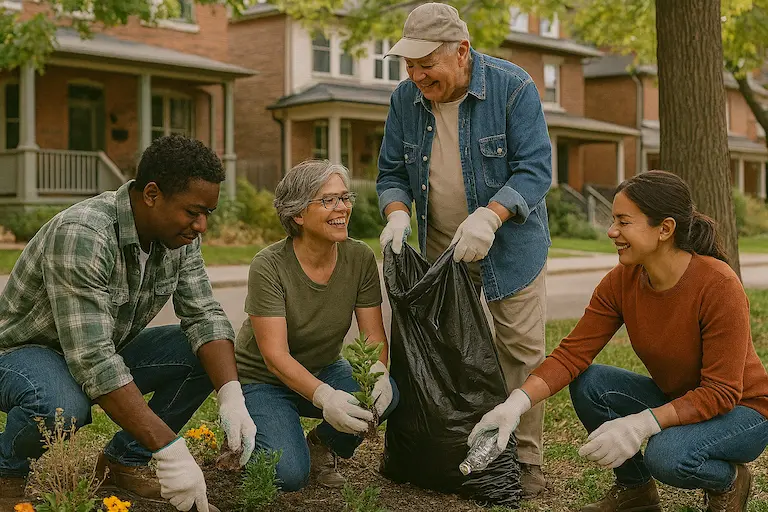
How To Focus on Everyday Habits, Not Just Special Events
In many families, cultural traditions take center stage during significant events—birthdays, anniversaries, or holidays.
While these events are important, they often focus more on the performance of culture than the daily practice of values. So, how do we move beyond the occasional into the everyday?
- Incorporate Values into Routines: Think about your family’s daily rhythms. Is kindness reflected in how siblings resolve disagreements? Do you use mealtime as a chance to express gratitude or share stories that reflect your family’s heritage? By making cultural values part of your routine tasks—like dinner conversations or bedtime rituals—they become ingrained in how your family operates.
- Model Values Consistently: For children, values are caught more than they’re taught. If respect is part of your family’s essence, how do you show it? From simple acts like saying “thank you” to actively listening without interrupting, modeling the values you hold dear teaches without the need for grand speeches.
- Make Everyday Tasks More Meaningful: Everyday chores can reflect cultural values, too. Tasks like gardening might teach stewardship of the land, while preparing meals together honors traditions around food and family. Even simple gestures such as volunteering or helping a neighbor reflect the cultural principles of community or generosity.
Focusing on daily habits doesn’t mean dismissing special occasions—it just means using them as a spotlight for values already practiced.
This way, cultural values aren’t isolated moments; they’re enduring aspects of who you are as a family.
Why Family Culture Is Shaped by What We Do Daily
At its core, a family’s culture isn’t defined by the events you celebrate but by the habits you form.
It’s easy to think of culture as something tied to big, visible moments, yet the true measure of a family’s identity lies in what they prioritize when no one’s watching.
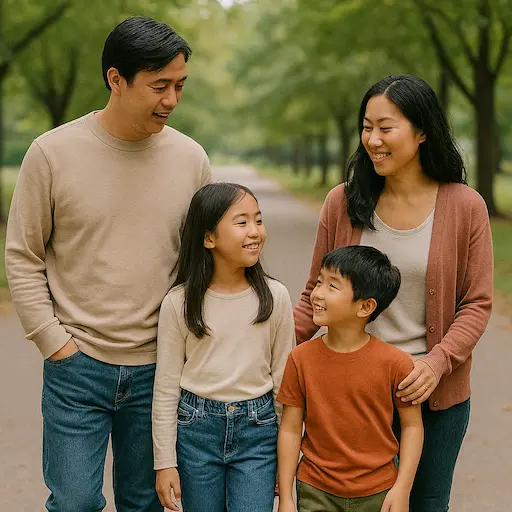
- Every Action Tells a Story: Each choice you make reflects what matters most. Do you prioritize compassion in how conflicts are resolved? Does your family actively engage in supporting each other’s goals and dreams? These daily decisions tend to highlight your values far more than any planned event could.
- Rituals Build Connection: Regular practices—like going on a family walk every evening, sharing a weekly gratitude list, or having Sunday dinners—reinforce a shared identity. Over time, these small acts create a sense of security and belonging, reminding everyone of the “why” behind the “what.”
- Small Choices, Lasting Impact: Imagine a drop of water on a rock. On its own, it seems insignificant, but with time it wears the rock down, reshaping it entirely. Daily actions work the same way. When your family consistently chooses respect, generosity, or courage, those values don’t just influence behavior—they shape identity.
Family culture is alive and ever-evolving—it’s shaped every time a family member chooses to embody kindness, integrity, or resilience.
By focusing on what we do each day, we ensure that cultural values aren’t tangential to who we are but central to how we live.
Using Everyday Moments To Build Cultural Understanding
Have you ever thought about how simple daily interactions can teach us about culture? It’s not always about grand festivals or elaborate customs.
Cultural understanding often grows best in everyday moments—those shared experiences that quietly reflect the values we hold close.
Whether it’s through casual conversations or leading by example, these ordinary encounters provide powerful lessons in empathy, connection, and respect.
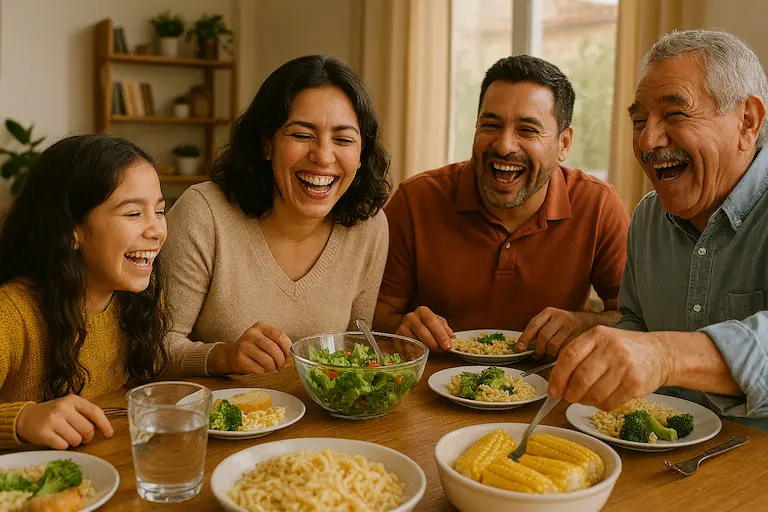
Conversations Around Meals and Chores
Some of the richest cultural lessons happen around the dinner table or while folding laundry together.
Why? These moments bring people together naturally and offer opportunities for honest, unscripted conversations. Meals, in particular, hold a special place in almost every culture.
Serving food isn’t just about nourishing the body; it’s a way to share traditions, tell stories, and strengthen family bonds.
Imagine a parent explaining why a certain dish is prepared in a specific way, sharing how it ties back to their roots or a family memory.
This is more than just passing down a recipe—it’s passing down history and identity.
Similarly, working on tasks like gardening or cleaning together can spark deeper discussions about values like responsibility, teamwork, and respect.
Not every conversation needs to be profound. Even casual topics—like asking a child why they think we say “thank you” after a meal—can help them connect behaviors to broader cultural values.
The goal isn’t to “teach a lesson” in a formal way, but to create an environment where values become part of the dialogue naturally.
These simple moments often teach more than planned lessons ever could. They show how culture lives in our daily rhythms, turning simple moments into insights about how we prioritize relationships, gratitude, and care for one another.

Leading by Example With Cultural Values
Values aren’t something we can just lecture about—they’re something we live. If you want to teach patience, humility, or generosity, the best place to start is by consistently modeling those behaviors.
Actions carry weight, often more than words, especially when children watch trusted adults navigate their own challenges and relationships.
Think of how small actions can demonstrate a foundational value like respect.
Greeting neighbors warmly, listening attentively when someone speaks, or offering help when it’s needed—these actions embody respect in ways that are immediately understood without explanation.
Over time, they become part of a family’s unspoken code, quietly teaching that kindness is a priority.
In multicultural or diverse settings, modeling inclusion can be significant.
For example, if a child hears their parent asking thoughtful questions about another family’s traditions—or better yet, participating—they begin to understand curiosity and openness as part of their cultural identity.

Our youngest even wants to learn Italian now, just from overhearing a conversation I had with an Italian friend. He was genuinely impressed.
These habits make way for a more empathetic and inclusive worldview as they grow.
Think of leading by example not as a lecture but a story you show instead of tell—a performance with no script.
Every decision you make reflects something about what you value, and these actions ripple outward, shaping the mindset of those who look to you.
By leaning into these everyday practices, cultures become living, breathing guides—ways to connect meaningfully while encouraging growth and understanding.
It’s not about making grand gestures but about anchoring deeper values in familiar moments.

“Culture isn’t just what we celebrate—it’s how we live when no one’s watching.”
Cultural values are the heart of what makes each community and family unique.
Unlike performances that capture fleeting attention, these values quietly influence our choices, interactions, and relationships every single day.
They are the invisible threads that hold traditions together, giving meaning to the actions and rituals we pass down.
I often think back to what I remember most growing up—and it’s not just the music or the food.
As much as I love jollof rice and highlife, I’ve always said I don’t want those to be the first things I mention when someone asks me about my culture.
There’s so much more—how we honor elders, how we welcome others in, how we carry responsibility even when no one is watching.
How proud we are. How rich it is. That’s the part I want to be known for and pass on.
Focusing on cultural values over outward displays allows us to live with intention. It brings authenticity into our connections and helps us prioritize what truly matters—respect, kindness, and a sense of community.
As you reflect on your own life, consider how these values shape not just what you celebrate but how you show up for others daily.
Ask yourself: Are you living the values you want to be remembered for?
Whether through your actions or the traditions you continue, there’s always an opportunity to deepen those cultural roots.
Let your everyday choices tell the story of what your values mean, long after any performance ends.
IF THIS POST SPOKE TO YOU, EXPLORE MORE OF THE JOURNEY ON OUR SITE.
You'll find free guides, intentional tools, and reflections to support cultural growth and legacy-building.
💬 Looking for connection? Join our Facebook community to continue the conversation.
📌 Pin an image to revisit or share with someone walking a similar path.
Thank you for being here.






